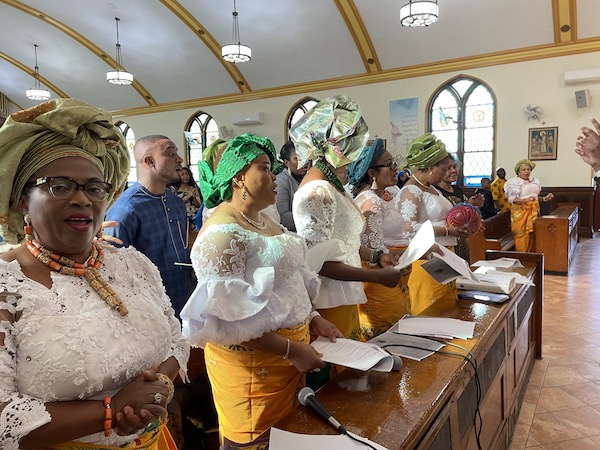

JAMAICA — Paul Ezegamba, music director at St. Clement Pope Church in Jamaica, lives 5,000 miles away from his native country of Nigeria, but keeps up with the happenings back home, and worries when he hears stories about anti-Catholic atrocities.
“I read about these terrible, terrible things and I feel so sad,” said Ezegamba, who moved to the U.S. 12 years ago and joined St. Clement Pope, a church with a large Nigerian population and where he eventually became music director.
Nigeria, a country of about 230 million people, 30 million of whom are Catholic, is a place where priests are frequently kidnapped and killed, and where churches have been firebombed by terrorists, according to Open Doors, a human rights organization.
Open Doors placed Nigeria seventh on its 2025 World Watch List of the 10 worst countries where citizens face persecution for their religious beliefs.
The Knights of Columbus, which sponsors charitable programs in Nigeria, estimated that at least 16,000 Christians were killed there between 2019 and 2023, and that 18,000 churches have been destroyed since 2009.
And the violence is showing no signs of letting up.
One recent example is the kidnapping and murder of Father Sylvester Okechukwu, who was taken from his residence in northwest Nigeria’s Kaduna State on March 4. His body was found the next day, on Ash Wednesday.
According to the organization Aid to the Church in Need, the Immaculate Conception Minor Seminary in the Diocese of Auchi in southern Nigeria was twice the target of terror attacks this year — on March 3 and again on July 10.
In both attacks, armed men stormed the seminary compound. A security guard was killed and three seminarians were kidnapped in the July incident. The March attack resulted in the kidnappings of seminarian Andrew Peter and a priest, Father Philip Ekweli. The kidnappers released Ekweli but murdered Peter.
On June 6, 2022, terrorists firebombed St. Francis Xavier Catholic Church in the city of Owo in southwest Nigeria, killing 80 people.
Ezegamba doesn’t just read about the terror attacks.
“I go home twice every year, so I know exactly what it looks like back home,” he said.
While Ezegamba never feared going to church because he’s from the eastern part of Nigeria, where attacks are less frequent, he said he feels a deep sense of sadness for people for whom attending Mass is fraught with danger. Yet, he noted that the threat has not stopped Nigerian Catholics from going to church.
“I feel that no matter how they are being persecuted, the persecution strengthens their faith all the more,” he said. “When their church is firebombed, they build a makeshift church. They keep going.”
There is evidence to back up his claim. According to a 2023 survey by the Center for Applied Research in the Apostolate (CARA), 94% of Catholics in Nigeria report attending Mass at least once a week. By contrast, 29% of Catholics in the U.S. report regularly attending Mass, according to a CARA survey in 2025.
Another St. Clement Pope parishioner, Augustine Onunaku, said going to church is something that comes naturally to Nigerians. “It’s your way of life,” explained Onunaku, who is a member of the church’s finance committee, adding that way of life continues no matter what is going on around them.
“In whatever situation they are, they still have to give thanks, give glory, and believe in God,” Onunaku said. “If it is a good situation, they believe in God that this situation may continue, and they may continue to flourish. If it is a bad situation, they believe in God that the situation should turn around for the better.”
Onunaku used to spend nights worrying about friends back home because they live in areas where many of the atrocities take place. His friends have since moved to the eastern part of the country, where it’s safer. “They are safer now. I am greatly relieved,” he said.
RELATED: Eager to Evangelize, Deacon Callistus Ibeh Is Ready to Live His Dream
Father Callistus Ibeh, parochial vicar for St. Sebastian Church in Woodside, who grew up in Nigeria, said he isn’t surprised that Nigerian churches are filled on Sundays.
“Now, this is where these people show their greatness, and this is where these people show their faith,” he explained.
Father Callistus, who was visiting family in Nigeria when he spoke to The Tablet on Aug. 4, said he had celebrated Mass in a few churches there during his stay, and while he admitted that he sometimes felt fear standing on the altar, he managed to overcome it.
“In the midst of fear, faith overrides,” he said.
The Nigerian Catholic community in the Diocese of Brooklyn, estimated to number around 2,000 people, is centered around three churches — St. Clement Pope in Jamaica, St. Fortunata in East New York, and St. Paul the Apostle in Corona — each of which offers Masses in Igbo, a language spoken in Nigeria.
Father Christogonus Iwunze, SDV, pastor of St. Clement Pope, who is also a native Nigerian, said many Nigerians attend Mass despite the dangers because church is a place of profound joy for them.
“There is dancing, singing. People wear colorful clothing. It is a celebration for them,” Father Iwunze said. “It is the same here in our parish. If you come here on Sunday, when we have our Mass with our Nigerian community, you see how happy they are to be there.”




